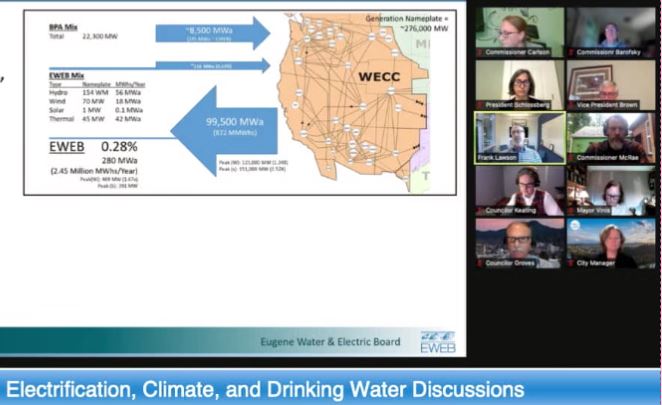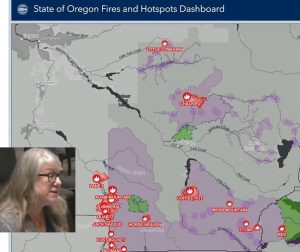EWEB: The electric grid is becoming more volatile
6 min read
EWEB General Manager Frank Lawson warned that drought and the need to protect threatened fisheries will affect hydroelectric energy throughout the Western U.S.
The City Council held its joint meeting with EWEB and heard: Climate change could cause rolling blackouts right here in Eugene, unless we start planning now.
[00:00:10] Frank Lawson: I am Frank Lawson, the general manager of EWEB, and it’s a pleasure to be here with you.
EWEB is reliant on a very large electric grid and indirectly on a gas grid. In both cases we’re small; less than 1% of the electric grid that’s all interconnected. So from an absolute perspective, we’re a bit insignificant in all that. However, that grid is becoming increasingly constrained. Hydro conditions and operating requirements are changing. Firm and dispatchable resources like coal are being retired— for good reason— with limited and not enough replacement.
One indication of the sensitivity developing as more and more scarcity and volatility starts to occur, that’s electric pricing that occurred this last February during a cold weather event. And normal prices, which would be $40 a megawatt hour, during that cold event went to over $300, and likely the carbon content shifted at the same time.
We also know that carbon content of the grid does change seasonally and daily. In essence, the grid is more expensive and dirtier when at peak and almost all studies are pointing toward capacity constraints in the future without some significant changes.
[00:01:26] Councilor Mike Clark: Frank, talk to me a little bit more about peak demand and reliability. One of the things I noticed there in the presentation was I must, I got this really wrong. You talking about high peak time having a 700% difference in cost. Can you talk more about that?
Thank you for supporting
local citizen journalism
[00:01:44] Frank Lawson: Yes, Councilor, I can. So there’s a number of things driving I’ll call it the volatility and uncertainty in the grid. We’re a little bit unusual in the country. We have a lot of hydro, hydro is not as prolific in other parts of the country. There are a number of different things affecting the future of hydro. One is the climate itself, which is starting to restrict water. Now, the Columbia Basin is a lot better than the Cascades but there’s still some future predictions that that will diminish.
And the other one is just operating conditions. So fish and wildlife restrictions are reducing the capacity of the system to respond. And I would be really clear to say that we’re talking about capacity. We’re not talking about average . We’re talking about the ability to go over and that’s the piece that is of most concern. When you take out things that are dispatched by humans like coal, for example, and you replace it with intermittent resources, like wind and solar— and there’s very good reasons to do that— you create volatility in your ability to work and manage those peaks.
So, that scarcity will drive up prices. I suspect that capacity pricing will continue to increase relative to average pricing. And also at some point we are concerned that we’re just not going to build enough resource or enough transmission to respond. So there’s a reliability and a pricing concern.
[00:03:12] Councilor Mike Clark: Can you talk about reliability as it pertains to like California seeing blackouts as they do or managed brownouts or however you want to describe it?
[00:03:22] Frank Lawson: Right. The best way to leverage the diversity of wind and solar and other resources is to geographically be diverse as well. That’s going to require additional transmission and transmission is not easy or quickly built. I would describe the old days that there was a complete surplus of energy in the Northwest and when California needed it, especially in the summer, a lot of energy flowed to California. And when we were a colder in the Northwest, energy flowed the other way. Because it’s now integrated, we are starting to see more and more constraints.
We are very lucky that the heat dome at the end of June was not simultaneous to a heat wave in California and the desert Southwest, or it could have caused some supply issues. Those will first manifest themselves as pricing excursions, which we’re seeing. I described those as heart palpitations, if you want to classify them that way. And later if we don’t build out transmission and further resource, we will end up in a similar condition, with California or Texas or some of the other examples.
So we do need to increase our build-out of resources, I mean, it could be managed. I don’t wanna make it sound like it can’t be managed, but the difficult one is the one that builds on peak and space heating in particular is the one that builds on peak.
[00:04:44] Councilor Mike Clark: So my question about the reliability, will we see California blackouts in here at the pace we’re on?
[00:04:52] Frank Lawson: That’s a big hypothetical question. I guess I would say there’s a number of things that are going to affect this over the next five to eight years. One of them is, we’re part of the Bonneville system. Bonneville would likely violate environmental laws to keep the grid on. At some point it’d be, it starts as pricing. They would probably violate some of their fish and wildlife flow restrictions if they had to, to keep the lights on.
I wouldn’t necessarily expect, in the next five to eight years, that that happens. Starting to look beyond that, if we don’t build out resources, it’s an issue of risk. We’re putting ourselves at greater and greater risk and the models that we’re seeing across the Northwest reinforce that under low hydro conditions, extreme temperatures, and other sorts of load excursions, the probability of at least rolling conditions like that, where we would have to curtail load, are increasing.
[00:05:56] Councilor Randy Groves: I just got back from Germany and Switzerland and in Germany, the climate where I was at was very similar to our area. In fact, it looked like the Willamette Valley and everywhere I looked there were solar panels. I was absolutely blown away by the amount of solar generation capacity they have. Have we looked at that anymore, Mr. Lawson?
[00:06:16] Frank Lawson: Yes, Councilor. So the studies that I’ve seen do indicate that there is a need, even in the Northwest—and you consider the Northwest a fairly broad footprint—to build out more renewables, including solar. …But I do agree that more wind, more solar is needed throughout the Pacific Northwest, really the west coast, that’s where you leverage your diversity as well as one of the big missing pieces that right now is very expensive, but also very important is storing. And that’s something that we need some some innovation on and we need some economics to help that situation.
[00:06:54] Councilor Randy Groves: Thank you. And just as you’re planning out your new reservoirs, I had an opportunity to tour the Hawkins and 25th Avenue site. Are we giving any consideration to engineering the roof structures so that they could, at least in the future hold solar panels because the footprint can’t be really used for anything else?
[00:07:13] Frank Lawson: I don’t know that that’s been in our design criteria, Councilor. I’d have to get back to you on that.
[00:07:21] EWEB Commissioner John Brown: To kind of piggyback on Councilor Groves’s question, if the Snake River dams are eliminated, or the Chinook salmon are taken from threatened to endangered, what does that do to our electric capacity, our ability to have hydro because we’re so hydro-dependent on our ability to generate?
[00:07:40] Frank Lawson: I’ll strictly speak from the electricity perspective. When you start removing hydro and hydro storage in particular, you reduce our capacity to respond to events and produce carbon-free resources. That’s independent of the fish examples as well. So it puts pressure on the remaining part of the system.
I will say that it is going to get more complicated. It is going to be regulated more and there’s no sign that environmental regulations on dams and other things is going to get easier. You know, the state of Oregon is part of a federal lawsuit which is challenging the spill regimes on the Columbia. That will have impacts, if that goes through. More water will be spilled and less will be used for generation, and that’s to protect endangered fish. So all of those have negative impacts on the system’s ability relative to capacity.



